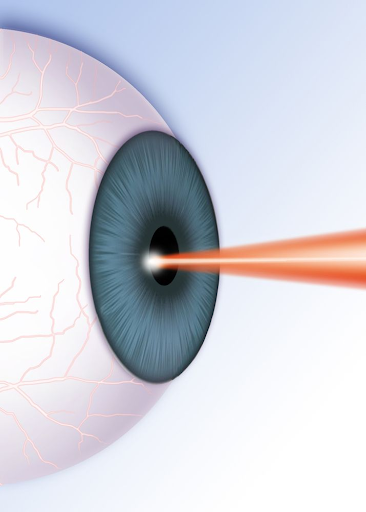
While the loss of vision as a result of complications is rare, some side effects, notably dry eyes, and temporary visual disturbances, are quite common. But these usually get better after a few weeks or months, and very few people consider it to be a long-term problem.
Dry eyes LASIK surgery induces a momentary decrease in tear production. For the sooner six months after your surgery, your eyes may sense unusually dryness as they recover. Even after treatment, you may experience an increase in dry eye symptoms. Your eye doctor may recommend using eye drops during this time. If you experience extremely dry eyes, you may opt for another procedure to place special plugs in your tear ducts to prevent your tears from draining away from the surface of your eyes.
Glare, halo, and double vision. After surgery, you may have a problem catching a glimpse at night. You may see glare, halos around bright lights, or double vision. This usually survives from a few days to a few weeks, but it can also, come to be a chronic difficulty.
Improvement. If the laser removes too little tissue from your eye, you may not get the clear vision results you were hoping for. Under correction is more common for nearsighted people. You may require another refractive surgery within a year to peel off more tissue.
Overcorrection. It is also possible that the laser will remove too much tissue from your eye. Overcorrection can be more difficult to correct than under-correction.
Astigmatism. Astigmatism can be caused by irregular tissue expulsion. This may require additional surgery, glasses, or contact lenses.
Corneal ectasia. Corneal ectasia is one of the more serious complications and is caused by progressive myopia due to curvature of the cornea.
Flap problem. Folding back or removing the flap from the front of your eye during surgery can lead to complications, including infection and excess tears. The outermost corneal tissue layer (epithelium) beneath the flap may grow abnormally during the healing process.
Vision loss or change. Rarely, you may experience vision loss due to surgical complications. Some people cannot even see as sharply or as clearly as before.
LASIK vs reading glasses
By the mid-40s, all adults lose some ability to focus on nearby objects (presbyopia), resulting in difficulty reading small print or doing close-up tasks.
One potential advantage of being nearsighted for most of your life is that the condition actually compensates for presbyopia that inevitably develops as you get older. Myopia focuses objects on its own without glasses. LASIK surgery removes this near focus as the nearsightedness is corrected. This means that you will need to use glasses to read as you get older. Many people are happy to trade clear distance vision when they are younger to wear “cheaters” for reading when they are older.
If you are an older adult considering LASIK, you may choose monovision to preserve your ability to see objects up close. With monovision, one eye is corrected for distance vision and the other eye is corrected for near vision. Not everyone can adapt to or accept monovision. It is best to test with contact lenses before having a permanent surgical procedure.
Can you live without your contact lenses for several weeks before surgery?
This is usually not a problem, but know that you will need to completely stop wearing your contact lenses and switch to glasses for at least a few weeks before your surgery. Contact lenses misinterpret the natural contour of your cornea, which can lead to inaccurate measures and a less-than-optimal surgical outcome. Your doctor will provide specific guidelines based on your condition and how long you will be wearing contact lenses.
What are your hopes for LASIK?
Most people who undergo LASIK surgery will have good to excellent vision in most conditions for many years or even decades. You can play sports and swim, or even check the clock first thing in the morning without worrying about your glasses or contact lenses.
Most people report high satisfaction after LASIK surgery. But long-term results are often not available or have not has been well studied. One reason for this is that people are overall satisfied after surgery, so they do not feel the need to have frequent checkups, and follow-up data is not collected. Plus, the LASIK procedure has been refined over time—techniques and techniques are constantly changing. This makes it difficult to conclude the reported data.
Be aware that conclude follow-up is performed and reported, and vision is still measured under optimal testing conditions. Your vision in dim light may not be as good as published statements recommend it will be.
Over time, your refraction may gradually get worse with age and your vision may not be as good as it was immediately after surgery. This doesn’t seem like a big problem, but the exact degree of change expected is sometimes unpredictable.
How do you choose an eye surgeon?
Most people do not have direct knowledge about LASIK or any eye surgeon. A good thing point when choosing an eye surgeon is to talk to an eye professional you know and trust. Or ask companions or family members who have had prosperous LASIK.
Your eye surgeon will probably work with a team who can help with your initial assessment and measurements. But it is your surgeon who bears the ultimate responsibility of determining whether LASIK is an appropriate option for you, who confirms the measurements to guide the procedure, who performs the procedure, and who delivers postoperative maintenance.
Talk to your eye surgeon about your queries and problems and understand how LASIK will help you. He/she can assist you to understand the advantages and constraints of surgery.
Final judgment
When it comes to LASIK eye surgery, there is no straightforward explanation. Carefully consider the factors outlined here, weigh your priorities and risk tolerance, and make sure your expectations are realistic. Talk to an eye surgeon like http://www.visualaidscentre.com/lasik-eye-surgery-in-delhi/ you feel confident with and get your questions answered. Lastly, if it feels right, go ahead, but if it doesn’t, don’t rush into anything.








